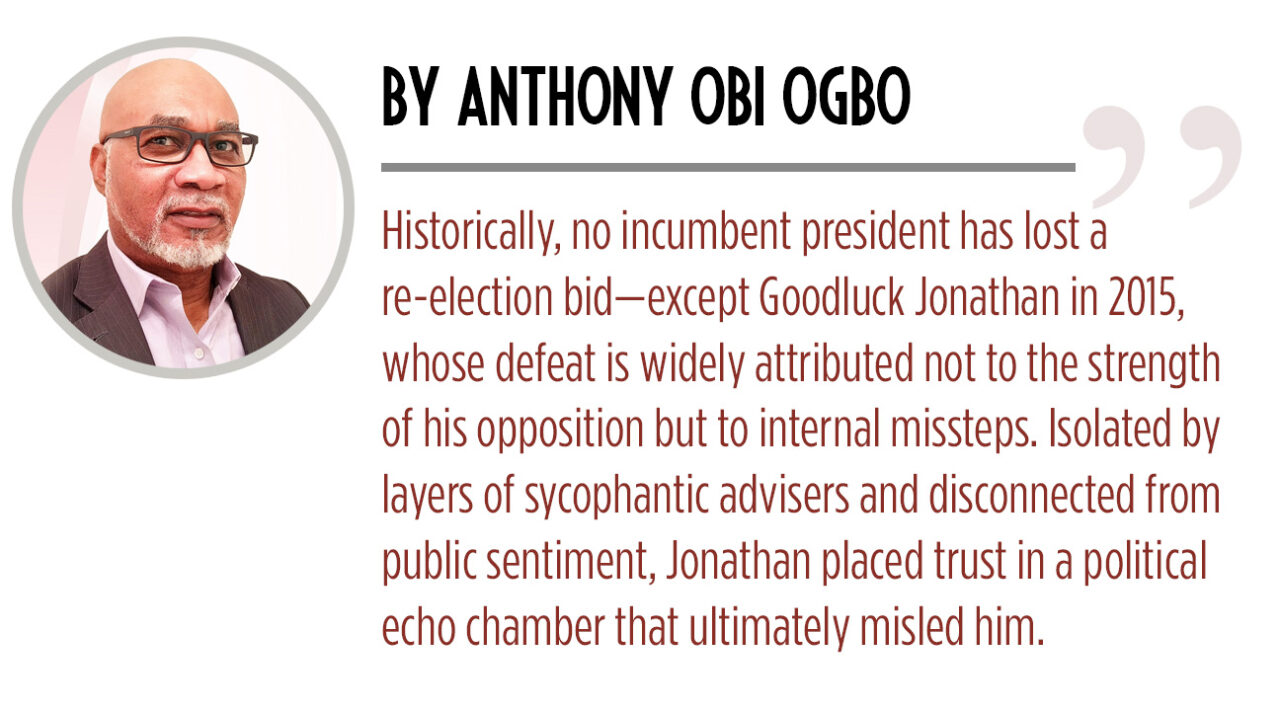“The Executive wields significant and often unchecked influence over the institutions critical to the democratic process” —Anthony Obi Ogbo
As Nigeria approaches the 2027 general elections, all eyes are on incumbent President Bola Ahmed Tinubu of the All Progressives Congress (APC), who is expected to seek a second term amid mounting national discontent. His administration, marred by persistent allegations of corruption, ethnic favoritism, and constitutional overreach, has faced sharp criticism from both civil society and opposition blocs. Questions surrounding fiscal opacity, particularly in budget allocations, alongside his controversial academic credentials and ineffective international engagements, have intensified public skepticism about his leadership and intentions.

In what may signal the onset of a fierce political confrontation ahead of this pivotal election, three heavyweight opposition figures—former Vice President Atiku Abubakar and former Governors Nasir El-Rufai and Rotimi Amaechi—have jointly set their sights on unseating President Tinubu and dismantling the grip of the APC. Describing the current administration as presiding over a regime marred by deepening poverty, rampant insecurity, economic stagnation, and institutional decay, the trio announced a political realignment to “rescue Nigeria from systemic collapse.”
The bold declaration has already intensified political tensions, drawing a sharp rebuttal from the APC. Through its National Publicity Secretary, Felix Morka, the ruling party dismissed the trio’s criticisms as “a calculated deflection,” arguing that the opposition figures themselves failed to deliver lasting reforms during their combined 24 years in high-level political office between 1999 and 2023.
This brewing political contest sets the stage for a historic election cycle, where questions of leadership credibility, national recovery, and democratic integrity will dominate the national discourse. While the opposition continues to build up, only a few are sufficiently engaged with the entrenched institutional challenges that threaten the very integrity of Nigeria’s democratic process —the most formidable being the implausibility of unseating a sitting President. This entrenched difficulty is not merely a function of political popularity or party dominance but rather a deeply imbalanced governance architecture that disproportionately empowers the executive arm of government.
The Nigerian executive wields significant and often unchecked influence over the institutions critical to the democratic process: security agencies, the judiciary, and the electoral commission. These are the very pillars responsible for safeguarding transparency, enforcing the rule of law, and ensuring the integrity of elections. However, in practice, they often operate under the shadow of executive pressure, patronage, or outright control.
This over-centralization of authority creates a political environment where incumbents are not only insulated from accountability but are also equipped with the institutional leverage to influence electoral outcomes in their favor. Consequently, genuine political competition becomes stifled, opposition parties systematically weakened, and democratic transitions of power rendered exceptional rather than routine.
The concentration of power within the executive—particularly its influence over security forces, the judiciary, and the electoral commission—creates a dangerous imbalance that favors incumbency at the expense of free competition. Without meaningful reform and the insulation of democratic institutions from political interference, the 2027 elections risk becoming another exercise in formality rather than a true expression of the people’s will. The stakes, as history has repeatedly shown, could not be higher.
In Nigeria’s deeply flawed political architecture, incumbency is not merely an advantage but a strategic stronghold. Successive presidents have leveraged the whole state machinery, including control over security, electoral institutions, and judicial levers, to secure re-election or ensure succession within their party ranks. The structural imbalance heavily tilts the political playing field in favor of those already in power.
Historically, no incumbent president has lost a re-election bid—except Goodluck Jonathan in 2015, whose defeat is widely attributed not to the strength of his opposition but to internal missteps. Isolated by layers of sycophantic advisers and disconnected from public sentiment, Jonathan placed trust in a political echo chamber that ultimately misled him. His loss marked a rare exception in Nigeria’s democratic experiment, underscoring how even incumbency can falter under the weight of complacency and strategic miscalculation.
Despite criticism over economic hardships and security challenges, the APC’s political machinery remains robust. The party has witnessed defections from opposition ranks, further strengthening its base. While the opposition is strategizing to mount a formidable challenge, the incumbent’s entrenched position, coupled with a fragmented opposition landscape, suggests that Tinubu’s prospects for re-election remain strong. The interplay of political strategy, institutional control, and recent policy initiatives positions the APC favorably as the nation heads toward the 2027 elections.
Until structural reforms ensure true independence and insulation of key democratic institutions from executive overreach, the notion of a free and fair political contest, especially against incumbents, will remain more theoretical than real.
♦Publisher of the Guardian News, Professor Anthony Obi Ogbo, Ph.D. is on the Editorial Board of the West African Pilot News. He is the author of the Influence of Leadership (2015) and the Maxims of Political Leadership (2019). Contact: anthony@guardiannews.us
- The Great Divide – How City Boys & Village Boys Mirror Nigeria’s Deepest Political Fractures - February 25, 2026
- China Dazzles the World with Its Spring Festival - February 20, 2026
- Things Are Not the Same Without Osinbajo – Makinde - January 25, 2026
